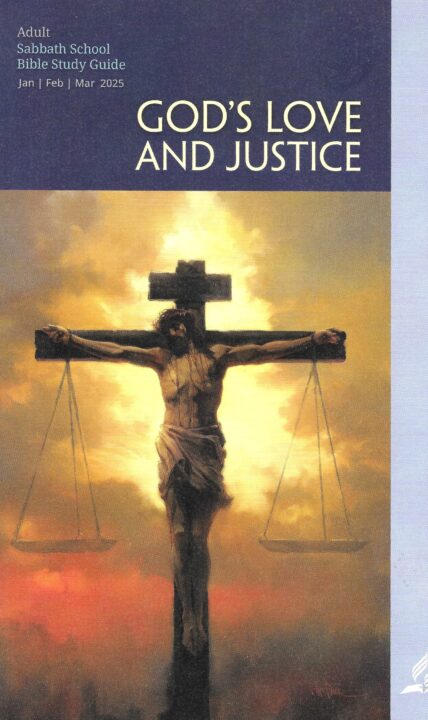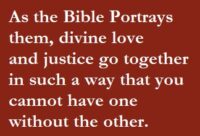Introduction: God’s Love and Justice
God is love. So says 1 John 4:8, 16. The entirety of the Bible testifies to this fact. The Christian faith is centered on God’s character of love. Love is at the core of who God is, at the core of everything that we believe, and should be at the core of everything we do. Accordingly, the way we understand love affects the entirety of our faith and practice. If, for example, one believes that God’s love must be earned or merited, a person might think that God does not love them because they are sinful and unworthy. And, in relation to others, one might expect others to merit love—a recipe for disaster.
In this and many other ways, how we understand God’s love has massive implications for our faith and practice. Yet, what is love? If you ask ten people to define love, you might get ten different answers. Even among Christians, there are many myths and misunderstandings about God’s love.
For example, Christians offer different answers to such questions as: Does God’s love only give but never receive? Is divine love purely self-sacrificial, or might God also delight in and be pleased by humans? Is God’s love emotional? Does God really care about humans? Can God’s love be rejected of forfeited? Does God enter into a back-and-forth love relationship with creatures? Is anger incompatible with love? How do love and justice go together? If God is love, why is there evil in the world, and so much of it? Can humans love the way God does? If so, what would that look like?
The answers to some of these questions might seem obvious but are often disputed in Christian treatments of divine love. And many answers that are sometimes taken to be obvious, turn out on closer inspection to be incompatible with what Scripture teaches about God’s love.
We will not address all these questions at once, but we will take up these and other questions throughout this quarter. And we will see that God’s love is far greater than we might think. God’s love as depicted in Scripture is far superior to the ideas that pass for “love” in much of our world today. In the coming weeks, we will look more closely at some of the most prominent and beautiful aspects of God’s love that are revealed in the Bible.
And, as we continue on, we will see how divine love and justice are inextricably connected. The God of the Bible loves justice (see, for example, Isa. 61:8). And, as the Bible portrays them, divine love and justice go together in such a way that you cannot have one without the other. Because God is love, He is deeply concerned about injustice and suffering in this world, and He identifies Himself with the oppressed and the suffering, willingly entering into the pain and grief that evil has wrought in creation—Himself suffering most of all so much so that God Himself is the greatest victim of evil.
Throughout the Bible, God is repeatedly grieved and pained by evil and suffering because He loves each person more than we can possibly imagine. One can see the depth of God’s love in the lament of Christ over His people when He said: “ ‘O Jerusalem, Jerusalem, the one who kills the prophets and stones those who are sent to her! How often I wanted to gather your children together, as a hen gathers her chicks under her wings, but you were not willing!’ ” (Matt. 23:37 NKJV).
The God of the Bible, who is love, is often portrayed throughout Scripture as brokenhearted and grieved by love rejected and love lost. The entire story of Scripture is about what God has done and is doing to restore love to every corner and crevice of the universe. This and much more is the topic of this quarter’s lessons.
John C. Pekham is an associate editor for the Adventist Review. At the time this guide was written, he was a professor of theology and Christian philosophy at the Seventh-day Adventist Theological Seminary at Andrews University.



I grew up on a farm in a bygone era where all our cows had names, orphaned lambs were our pets, our chooks (chickens) roamed wherever their dance took them, and our working dogs were our playmates. It sounds idyllic and compared to modern farming it was. But, there was the other side of farming. Cow-poo had to be cleaned out of the milking shed, we had to help ewes with their lambing (you don’t want me to describe that), and rogue dogs had to be shot. I have experienced it all.
I could write a book about my childhood farming, painting a utopian picture that would make easy bedtime reading. But if I was to be true to reality, some of the book would make very hard reading in today’s society.
There is a tendency to “glamorise” God’s love in words and song. We even have a whole theology about “agape” love to ensure we are talking about the right kind of love.
My prayer is that as we study God’s love and justice this quarter we come to understand that God’s love is practical down-to-earth (symbolism intended) goodness, and that we learn to apply it to ourselves.
Are only some people allowed to speak out about bullying, corruption, and injustice to steer the narratives thereof and control the flow of information?
I don’t really know where you are coming from with the question.
Thanks to God for granting us an opportunity to attempt to understand two aspects of his nature: love and Justice. I pray to our gracious good Lord to grant us new understanding and revelation. Dear Lord, please help us not only to be hearers of your Word but also be doers of your Word. By practicing a little more love and justice our families, societies, communities, workplaces, churches, and nations shall be transformed into lovely and peaceful places. As we embark on this exploration, may it be our genuine desire to be changed by God’s love and justice.
“He has shown you, O mortal, what is good. And what does the Lord require of you? To act justly and to love mercy and to walk humbly with your God” (Micah 6:8 – NIV).
I ask: ‘What is Represented by “Love and Justice”?’, and eagerly anticipate delving deeper into the spiritual dimensions of “Love and Justice.” At present, I understand Agape-Love and Justice as profound expressions of the Creator’s mysterious nature — essential elements in the creation of all that exists and in the unfolding journey of humanity as living souls.
Though fallen, humanity is invited to live “in” Jesus Christ, restored by His Love and Grace. God’s Love and Justice were manifest even in Eden. Reflecting on my own life, I recognize how these qualities have shaped my physical, emotional, and spiritual maturity. Physically, I have learned what sustains a healthy body; emotionally, I have discovered the importance of regulating my well-being; and spiritually, I strive to grow in the wisdom and understanding of Jesus’ teachings on righteousness.
In considering the nature of maturity, I see humility as its foundation. It begins with accepting the finite nature of our existence, acknowledging our limitations, and remaining open to the Holy Spirit’s guidance. True wisdom, as expressed in Proverbs 9:10, lies in applying knowledge, understanding, and insight with precision to make righteous decisions.
As the lesson writer expressed, I also resonate with the idea that Love and Justice are inseparable – two sides of the same divine coin. I often think of this coin as God’s Grace — a perfect, life-giving balance of Love, Justice, and Mercy. His Agape-Love is its essence, and His Mercy provides the “sparkle” which illuminates this remarkable Truth.
In the church we love to talk about a balance between love and justice, but I think we’re actually buying into the myth that love = nice and happy when we say that. The reality is justice is part of God’s love. It isn’t an opposite to love like the picture with the balance suggests. Everything God does is an expression of His love. And this love is expressed in different ways, but it’s still love. The Bible tells us God is love but it never says God is justice. He is a God of justice, which is a difference. Love is first and encompasses everything else.
While we often say, “God is Love,” why don’t we just as often recognize and say that “God is Justice”? Is it because we see God’s love now, and we won’t truly see God’s justice until the Final Judgement?
If we’ll continue to see God’s Love throughout eternity, will we just as easily continue to see God’s Justice as well?
Because the Bible never says “God is justice.” It says He is a God of justice which to me indicates that justice is something He does. And we do see God’s justice now, but in smaller ways. I would argue that we do not see God’s love fully right now either. Now we see in part….
Love is not at odds with justice. In fact, it is very unloving to just let anything and everything go. God’s justice is an expression of His love, but love is first and foremost.
I love my God because he loves me so much 🙏🙏🙏❤️❤️
I want to have that book 📚
I’m an Adventist church members I need a lesson
Buenos días Bendiciones hermanos El amor Q nuestro Dios a hecho de nuestras vidas una transformación tal amor es eso que hoy podemos comprender y compartir Q hay esperanza en Cristo ha un viendo todo lo que esta pasando en nuestro entorno el amor de Dios nos abre los ojos y la mente gracias por ese amor incondicional Bendiciones para todos
Google translate:
Good morning Blessings brothers. Love That our God has transformed our lives such a love is what today we can understand and share That there is hope in Christ seeing everything that is happening around us God’s love opens our eyes and minds Thank you for that unconditional love Blessings to all
Congratulations all the messages are true
AMEN 🙏